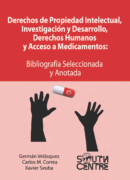Intellectual Property Rights
User Rights Symposium 2025: Principles for Progress in Digital Copyright
Geneva, Switzerland
16-18 June 2025
This year’s symposium will be hosted by PIJIP’s Geneva Center on Knowledge Governance and the South Centre, with collaborating partners IFLA (International Federation of Library Associations and Institutions), the Knowledge Rights 21 Project, COMMUNIA Association for the Public Domain.
American University’s Program on Information Justice and Intellectual Property invites you to participate in this year’s annual meeting and Symposium of the Global Expert Network on Copyright User Rights in Geneva, Switzerland. The goal of this year’s symposium is to share research and deliberate over principles that guide protection of the public interest in the digital copyright issues WIPO is considering. We seek presentations of research and views on the following:
(more…)
Submission by the South Centre to the Office of the United Nations High Commissioner for Human Rights on Inputs for the comprehensive report on ensuring access to medicines, vaccines and other health products (HRC resolution 50/13)
January 2025
The South Centre has provided input for the OHCHR report on new developments and challenges in ensuring access to medicines, vaccines and other health products.
(more…)
The Doha Ministerial Declaration on TRIPS and Public Health on its Twentieth Anniversary
By Nirmalya Syam, Viviana Munoz, Carlos M. Correa and Vitor Ido
This Policy Brief reviews the role of the Doha Declaration on TRIPS and Public Health in the twenty years since its adoption. It finds that the Doha Declaration has contributed to advance the use of the TRIPS flexibilities to promote public health and should be considered an important subsequent agreement to the TRIPS Agreement, despite the continuing challenges for WTO members to implement the TRIPS flexibilities in full. This brief also analyses the extent to which the Paragraph 6 System that became an amendment of the TRIPS Agreement as a new article 31 bis, pursuant to the Doha Declaration, has facilitated access to medicines and vaccines for countries with none or insufficient pharmaceutical manufacturing capacity. It finds that the system to date has not lived up to its promise. The Policy Brief recommends that WTO members assess and identify the challenges for the full use of the TRIPS flexibilities to promote public health, and advances that supplementary tools will need to be designed to never again allow such inequity in access to life saving vaccines and treatments as in the present COVID-19 pandemic.
(more…)
Intellectual Property and Plant Protection: Developments and Challenges in Asia
Dr. Kamalesh Adhikari
The creation of legal regimes to protect exclusive intellectual property rights over new plant varieties is not a recent phenomenon. National laws that recognise intellectual property for plant varieties originated decades ago in North America and Europe. The first of these laws took the form of a specialised plant patent regime, which the United States of America introduced in the form of the Plant Patent Act in 1930. A few decades later, laws to protect plant varieties as intellectual property appeared in the form of national plant breeders’ rights regimes in a number of developed countries, initially in Europe and later in other regions. A major motivation for these developed countries to embrace plant breeders’ rights regimes was the advent of the 1961 Convention of the International Union for the Protection of New Varieties of Plants (the UPOV Convention). Mainly after the mid-1990s, an increasing number of developing and least-developed countries in Asia as well have begun either to draft or implement national legislation to grant intellectual property for plant varieties, albeit in ways that are distinct from how developed countries of North America and Europe have conceptualised their national plant breeders’ rights laws. (more…)
The Imperative of Protecting and Respecting Indigenous Peoples’ Rights to Their Traditional Knowledge, Traditional Cultural Expressions and Genetic Resources in the Intellectual Property Rights Regime under the WTO and WIPO
By Victoria Tauli-Corpuz
Victoria Tauli-Corpuz, UN Special Rapporteur on the Rights of Indigenous Peoples and Member of the South Centre’s Board, made a presentation, reproduced below, about ‘The Imperative of Protecting and Respecting Indigenous Peoples’ Rights to Their Traditional Knowledge, Traditional Cultural Expressions and Genetic Resources in the Intellectual Property Rights Regime under the WTO and WIPO’ at the International Conference on the TRIPS-CBD Linkage: Issues and Way Forward, held at the Palais des Nations, Geneva on 7-8 June 2018. The conference was jointly organized by the South Centre, the Centre for WTO Studies, New Delhi and the Indian Institute of Foreign Trade, and co-sponsored by the Permanent Missions of Brazil, India, Indonesia and South Africa to the WTO. (more…)
Derechos de Propiedad Intelectual, Investigación y Desarrollo, Derechos Humanos y Acceso a Medicamentos: Bibliografía Seleccionada y Anotada

Descripción:
El Centro del Sur ha preparado esta bibliografía seleccionada y anotada para asistir a los países en desarrollo en la implementación de políticas y reglamentaciones en materia de PI de manera coherente con los objetivos de desarrollo y los principios de salud pública. El creciente volumen de literatura que se está produciendo en torno al tema de PI, I+D, derechos humanos y acceso a medicamentos en los últimos cinco años puede ayudar a los países a encontrar las oportunidades y el espacio de maniobra para proteger a los ciudadanos de los países en desarrollo del medio insano que han generado las nuevas normas del comercio internacional.
Autores: Germán Velásquez, Carlos M. Correa, Xavier Seuba
(more…)













